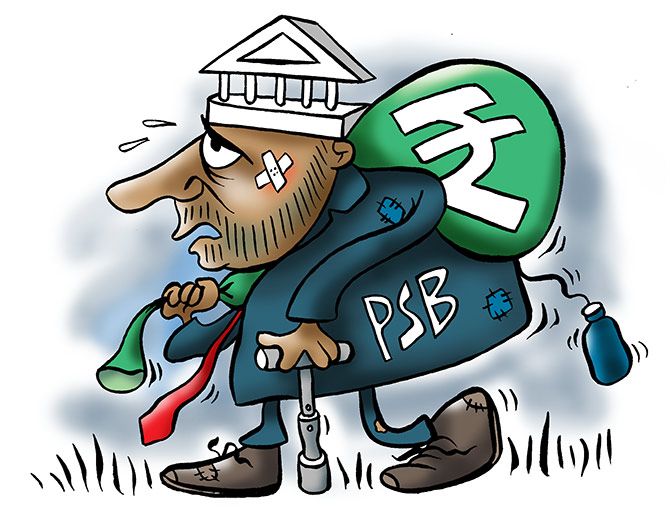Experts say the recent Rs 14,000-crore PNB fraud could have been avoided had there been an integration of PNB's CBS with its SWIFT system
Illustration: Uttam Ghosh/Rediff.com

The banking sector is planning to create a blockchain platform with SWIFT India to prevent frauds and ensure transparency and security of real-time transactions.
SWIFT India, a leading provider of secure financial messaging services for the global financial sector, has partnered with fin-tech company MonetaGo for a pilot project.
The first blockchain project in the country went live some months ago, wherein MonetaGo developed a blockchain platform for the Trade Receivables Discounting System (TReDS) or bill discounting exchanges.
SWIFT, or the Society for Worldwide Interbank Financial Telecommunication, provides messaging services to domestic market infrastructures, banks and corporates, enabling the financial community to exchange automated, standardised financial information securely and reliably.
Further, the SWIFT system helps reduce costs and risks while improving compliance.
This is a significant move, say experts, as the banking sector has been hit by a spate of frauds in recent years.
Earlier this year, it was revealed that diamond exporters Nirav Modi and Mehul Choksi, with the help of a Punjab National Bank (PNB) employee, ensured that the Letters of Credit that were routed through the SWIFT system were not reported in the Core Banking System (CBS) of PNB.
The Rs 14,000-crore fraud, experts say, could have been avoided had there been an integration of PNB’s CBS with its SWIFT system.
Internally, SWIFT has also been hit by a cyber scam in which hackers tried to steal $100 million from the Bangladesh central bank two years ago by gaining unauthorised access to SWIFT codes.
"Given India's focus on a digital infrastructure which is supported by both policy and technological innovation, it makes sense that large institutional players are interested in these products and initiatives," says Jesse Chenard, chief executive officer of MonetaGo, a US-based company.
"This work is going to positively impact the information available to the banking industry at large,” he says.
Kiran Shetty, chief executive officer of SWIFT India, says: “SWIFT India is committed to providing significant value to the Indian financial community through digitisation of trade. MonetaGo’s expertise in providing fraud mitigation solutions to avoid double-financing and check authenticity of e-way Bill gave us the confidence to partner with them.”
Earlier this year, SWIFT partnered with 34 international banks - including Commerzbank, Societe Generale, Deutsche Bank and JPMorgan Chase - to create a blockchain platform for Nostro accounts.
Nostro accounts are those held by a domestic bank on behalf of a foreign bank, to facilitate trade financing and other cross-border transactions.
The banks found that the system improved the speed of cross-border transactions, reduced costs and made the process of reconciling between different accounts more efficient.
Further, the distributed ledger technology (DLT) allowed for real-time liquidity monitoring, easy reconciliation, transaction status updates, full audit trails and visibility of expected and available balances.
However, it is strongly dependent on the existing systems of the banks.
Therefore a “one size fits all” approach was not possible.
There is a need for integration of the DLT with existing systems while banks improve their existing technology infrastructure from the bottom-up, say experts.
While the test case was successful, blockchain technology is still at a nascent stage and requires considerable development before handling billions of dollars worth of daily cross-border transactions between banks.
The pilot project used only 528 channels, whereas there are 10,000 channels that need to be covered to include all Nostro accounts held by the 34 banks worldwide.
The platform needs development "before it is ready to support production-grade applications in large-scale, mission-critical global infrastructures", SWIFT said in a statement in March this year.
It will be interesting to see the development of the SWIFT India and MonetaGo blockchain project, and to understand the possible development and implementation of the DLT platform across the banking sector in the country.












 © 2025
© 2025